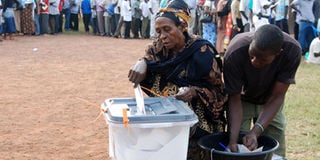Treat preparations for elections with urgency

What you need to know:
The issue: electoral reforms.
Our view: All other players must act swiftly to ensure that we have a credible election in 2021.
On Friday, officials of the Electoral Commission were in Parliament crying wolf over lack of funding for activities on the roadmap to the 2021 elections.
Hardly two weeks ago, distinguished lawyers and legal scholars Prof Fredrick Jjuuko and Prof Frederick Ssempebwa petitioned the courts over the government’s failure to cause changes to the electoral laws within the time recommended by the Supreme Court.
In the judgment in the election petition former presidential candidate Amama Mbabazi filed against the victory of President Museveni in the 2016 election, the Supreme Court required the Attorney General to ensure that within a period of two years, certain electoral reforms would be implemented.
The time passed and nothing happened, except that the government pushed through a change in the Constitution to lift the cap on age limit for presidential candidates, which is deemed to have been aimed at enabling President Museveni to run again in 2021 and beyond because he would otherwise be barred on account of age.
The Supreme Court recommendation to effect electoral reforms was cited as part of the justification for presenting the age limit amendment, even though it was not among the changes that the Supreme Court specifically pointed out that needed urgent amendment.
Since the 2006 elections, the government has always dilly-dallied about electoral reforms and ensured that the key reforms eventually don’t happen, with the reasoning that there isn’t sufficient time to push them through.
The proposed reforms – those pointed out by the court and those which were not – are many and have been around for long. They range from how the Electoral Commission is appointed to financing elections, time required to organise a fresh presidential election in case one is annulled, technology used in elections, role of the military in elections, among others. Clearly, these reforms would require a lot of time, and there is now just about one and a half years to the nomination of candidates around October 2020.
There had been indications that a commission would be set up to conduct a comprehensive review of the Constitution, but that also seems to be overtaken by events because the time left to the next election seems too short for that to happen.
The fear that the 2021 election could have serious shortcomings is, therefore, founded. The government and all other players must act swiftly to work on a plan that will ensure that we have a credible, free and fair election in 2021. And this will require concerted effort and goodwill. But this should be easy to do since we all know the potential problems a failed democracy can unleash on our country.




